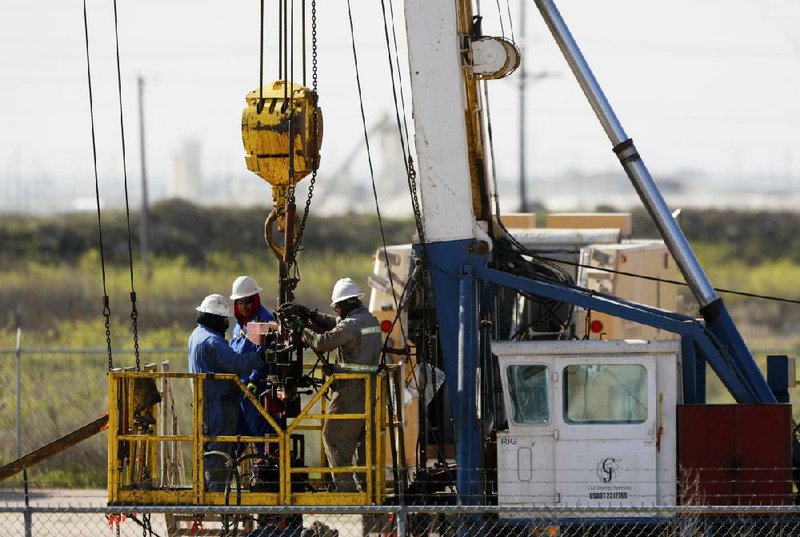HOUSTON -- A few months ago, Israel and some Arab countries were laying the groundwork for an energy partnership that held the potential for economic cooperation between once-hostile neighbors.
Israel started selling natural gas to Egypt, which in turn was reviving two gas export terminals, attracting badly needed foreign investment and opening a path for Israeli gas to Europe. Lebanon was preparing to drill its first offshore gas well after years of delays. And Palestinian representatives joined a regional forum with officials from Israel and other countries to increase energy exports to Europe.
But the coronavirus pandemic has abruptly interrupted those efforts, delaying exploration and exports. Gas prices, already low after a relatively warm winter in the Northern Hemisphere, have plummeted and storage facilities have filled to the brim. Struggling international oil and gas companies have slashed investment budgets, jettisoning projects.
The damage to the gas trade goes well beyond the Middle East, hurting businesses from Australia to the U.S. Gulf Coast. The pandemic is putting the brakes on a two-decade-long global expansion for natural gas, which has been replacing coal for electricity and heating and even competing with oil as a transportation fuel in some developing countries.
[CORONAVIRUS: Click here for our complete coverage » arkansasonline.com/coronavirus]
Now, tankers carrying gas in its compressed, cooled liquid form are sitting idle off the coasts of Europe as factories and businesses are only slowly coming back on line, if at all, and many people are forced to wait out the pandemic at home.
'BIG UNKNOWN'
"The coronavirus trajectory is a big unknown in both economic and financial impact and policy changes to manage the fallout," said Leslie Palti-Guzman, president of Gas Vista, a research and consulting firm. "But it poses unprecedented risk to LNG demand and investments."
Investment decisions for proposed multibillion-dollar liquefied natural gas export terminals -- which can take up to a decade to plan, permit and build -- have been delayed or canceled in Australia, Mozambique, Qatar, Mauritania, Senegal and the United States in recent weeks. Industry executives estimate that investments of more than $50 billion will be delayed this year and next. Coronavirus outbreaks have also interrupted supply chains and caused work force shortages, delaying construction of previously approved projects in Canada, the U.S. and Indonesia.
Even if the investment and construction delays are temporary, they could produce a shortage of gas and drive up prices later in the decade. That could potentially help coal. But delays would most likely also be a boon to renewable energy like solar and wind, which are already growing quickly because their use does not exacerbate climate change and their costs have been falling.
U.S. gas exporters, which could offer customers lower prices than suppliers in Qatar and Australia, have now lost that advantage since Asian and European gas prices have sunk. European countries have taken advantage of the flexible contracts that U.S. liquefied natural gas manufacturers offer and are canceling shipments.
WEIGHING OPTIONS
Houston-based Cheniere, the top American liquefied natural gas producer and exporter, says its final decision on a major expansion of an export facility outside Corpus Christi, Texas, now hangs on whether it can strike enough contracts with foreign buyers.
Sempra Energy, based in San Diego, announced May 4 that it would delay a final decision to build an export terminal in Port Arthur, Texas, until next year. That came after Texas LNG LLC delayed a final decision on a proposed terminal in Brownsville, Texas, and Royal Dutch Shell withdrew from a Lake Charles, La., joint venture with Energy Transfer.
Tellurian, also based in Houston, recently laid off 40% of its 176 employees and cut other expenses in an effort to save a proposed project in Lake Charles. The company is struggling to finance construction despite having a federal permit to produce and export 27.6 million metric tons of liquefied gas annually.
Still, industry executives are hopeful their business will bounce back.
"The coronavirus is going to delay decisions by a year, but it is not going to change the fundamentals," said Charif Souki, Tellurian's chairman.
He noted that China, which appears to have largely stopped the spread of the coronavirus, is starting to use more gas.
"There is no incentive to use coal at the moment," Souki said.
Still, some industry experts said that the pandemic could weaken the prospects for natural gas relative to renewable energy. With prices of solar and wind power declining, battery storage technology improving and concerns about climate change growing, renewables could be the biggest long-term threat to natural gas.
Jason Bordoff, the director of Columbia University's Center on Global Energy Policy, said demand for gas could recover in a few years and continue to replace coal in developing countries trying to reduce air pollution in big cities. But he added that the pandemic, especially if it is lasting, could force political leaders and business executives to be more wary of relying on gas imports that come from distant shores.
Business on 05/12/2020

